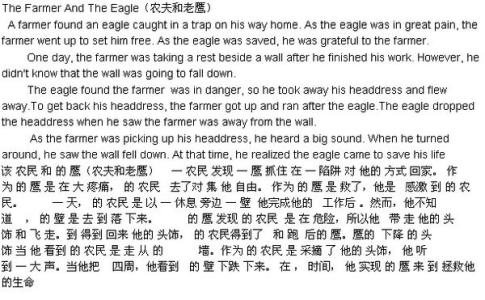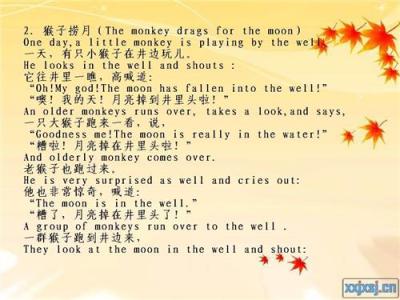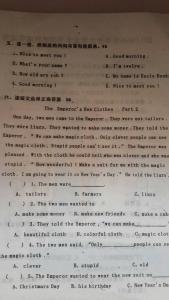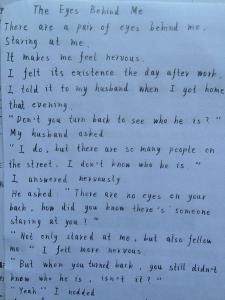随着经济全球化的发展和国际交往的日益频繁,语言成为人们互相交流的重要桥梁。英语教学已成为各级学校的重点教学内容。本文是关于初一英语故事短文,希望对大家有帮助!
关于初一英语故事短文:滥竽充数
During the Warring States Period (475-221BC), the King of the State of Qi was very fond of listening to yu ensembles. He often got together 300 yu players to form a grand music.
战国时,齐宣王喜欢听竽,通常是三百人的大合奏。
The king treated his musicians very well.
齐宣王给予乐师们非常优厚的待遇。
A man named Nanguo heard about that and he managed to become a member of the band, even though he was not good at playing the instrument at all.
所以有一个叫南郭的人尽管并不擅长吹竽,也设法混进了乐队。
Whenever the band played for the king, Nanguo just stood in the line and pretended to play. Nobody realized he was making no sound at all. As a result, he enjoyed his treatment just as the other musicians did.
当乐队演奏时,他就站在队伍里假装也在吹。没有人注意到其实他连一点声音也没吹出来,所以南郭也享受到和其他乐师一样的待遇。
When the king died, his son became the new ruler who also liked the music played on the yu. However, he preferred solos so that he ordered the musicians to play the yu one by one. Therefore, Nanguo had to run out of the palace.
齐宣王死后,他的儿子继承了王位。他也喜欢听竽,可是他喜欢听独奏,所以他让乐师一个个吹给他听,于是南郭不得不逃跑了。
The idiom "be there just to make up the number" is used to mock someone who pretend to be a specialist. You can also hear people saying it about themselves to show their modesty.
“滥竽充数”这个成语用来嘲笑那些没有真正才干,却混在行家里的人。人们有时也用“滥竽充数”来表示自谦。
关于初一英语故事短文:破釜沉舟
In the late years of the Qin Dynasty (秦朝,221 - 206BC), Xiang Yu (项羽) launched a rebellion.
秦朝末年,项羽发动了叛乱。
After crossing the Zhang River (漳河), Xiang Yu ordered his soldiers to sink all the boats and break their cooking pots.
在部队渡过漳河之后,项羽命令士兵把所有的船只都凿破,沉到河底,再把煮饭锅完全打碎。
He distributed each soldier three days' rations and warned them that there was no way return; the only thing they could do to survive was to fight against the enemy.
项羽给每个人只发三天的粮食,然后再上战场,这样做,是为了向大家表示“宁死不退”的决心。
After nine furious war, the Qin army was finally defeated.
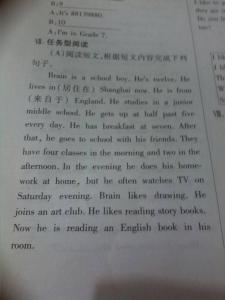
果然,经过九次的激烈奋战,项羽的军队终于打败了秦国的军队。
This idiom is used to reveal one's strong determination to achieve one's goal at any cost.
后来,我们使用“破釜沉舟”比喻:下定决心,不达目的绝不罢休的精神。
关于初一英语故事短文:do sth by the book
郑人买履
A man of the state of Zheng wanted to buy a pair of shoes.
从前,郑国有个人想买双鞋。
He measured his foot and put the measurement on a chair.
他量好了自己脚的尺码,把它放在了椅子上。
When he set out for the market,he forgot to bring it along.
可当他赶往市集时,却忘了带量好的尺码。
It was after he had found the pair he wanted that this occurred to him.
他要买鞋时,才想了起来。
"I forgot the measurement", said he.
他说:“我忘带尺码了。”
He went home to get it. But when he returned, the market had closed and he did not get his shoes after all.
他回家去取量好的尺码。等他赶回来时,市集已经关了,他还是没能买到鞋。
"Why didn't you try on the shoes with your feet?" He was asked.
有人问:“为什么不用你自己的脚去试一试鞋子呢?”
"I'd rather trust the measurement than trust myself."
他说:“我宁愿相信尺码也不相信我自己的脚。”
 爱华网
爱华网